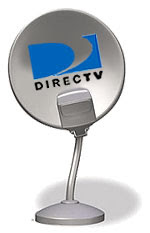9.12.2007
Satellite TV hacker fines limited
 I've been blogging at times noisily about satellite radio (not the programming, the merger), so for a change, here's a decision out of the Ninth Circuit yesterday for you satellite TV law buffs.
I've been blogging at times noisily about satellite radio (not the programming, the merger), so for a change, here's a decision out of the Ninth Circuit yesterday for you satellite TV law buffs.---------------------------------
Satellite TV Hacking Illegal But Not a $100,000 Offense, Court Says
(Wired, Sept. 11, 2007)
Users of illicit decoding technology who have hacked into DirecTV satellite signals are not liable under a certain provision of the Federal Communications Act that calls for hefty, $100,000 fines, a federal appeals court ruled Tuesday.
The decision by the 9th U.S. Circuit Court of Appeals said section 605(e)(4) of the act cannot be charged against individuals who have altered or purchased reformatted smart cards to acquire DirecTV for free. That statute, the court ruled, was meant to financially injure companies that produce and sell such pirating technology and was not directed at end users as DirecTV alleged
"Congress intended to treat differently individuals who played different roles in the pirating system," a three-judge appellate court panel wrote in its 2-1 decision.
The decision, if it stands, could have widespread implications, as DirectTV regularly sues hackers.
Jason Schultz, an attorney with the Electronic Frontier Foundation that filed a friend of a court brief in the case, applauded the court's decision. "The court said the assembling and manufacturing prohibition is meant for commercial entities or other upstream providers, not for individuals who simply plug a card into a box to get TV," he said.
"You can't have this huge $100,000 hammer for individuals that was meant for businesses, and people making profits," Schultz added. "What DirecTV was arguing was that anybody who tweaks their access card is liable for up to $100,000."
Still, the court said the two convicted hackers in the case are still liable under section 605 (a) of the Federal Communications Act for unlawfully pirating television. Maximum fines per count are $10,000.
DirecTV did not return calls seeking comment and whether it would ask the San Francisco-based appeals court to rehear the case or petition the U.S. Supreme Court to review it.
In dissent, Judge Eugene Siler said the bigger fines should apply. The act, he said, "does not limit its application to manufacturers and sellers."
----------------------------------------------------------
Here is Judge B. Fletcher's opinion: DirecTV v. Huynh and DirecTV v. Oliver.
EFF also posted an MP3 of oral argument along with various briefs.
The statute at issue was section 605(e)(4) of the Federal Communications Act.
And yes, DirecTV's legal maneuvering in connection with this issue proved let's just say unpopular among many. EFF along with the Center for Internet and Society Cyberlaw Clinic at Stanford University Law School co-sponsored a website at DirecTVDefense.org "to help people defend themselves," saying, "People who intercept DirecTV’s satellite signal are breaking the law. However, DirecTV’s cease and desist letter campaign does not distinguish the legitimate users from the thieves." The help site argues that "legitimate computer scientists, technology workers, and hobbyists . . . are being harassed by DirecTV's no holds-barred slash-and-burn legal strategy."
Over at CNET News, Declan McCullagh applauded the ruling: "DirecTV faces setback in dubious antipiracy campaign. Good." I think he's right.
(I don't see a public comment on this by DirecTV. Will update if the company appeals; although getting to the High Court would not be too likely.... Meanwhile, here is the company's site for "information concerning criminal and civil actions brought by DirecTV against those who fraudulently obtain DirecTV programming...")






